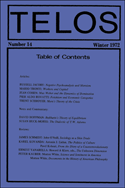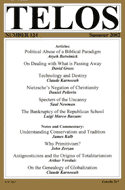By Joseph van der Naald · Wednesday, December 3, 2014  Mario Tronti’s postscript to the second edition of his publication Operai e Capitale, published in Telos in 1972 as “Workers and Capital,” provides the reader with a summation of his thought on the development of the “mass worker,” presented through an analysis of notable labor struggles across the Western world. Tronti’s methodology, which he briefly explicates at the beginning of the piece, delineates certain historical workers’ struggles in order to examine “macroscopic groups of facts yet untouched by the critical consciousness of labor thought” (25). His purpose is to yield “an historical model, a privileged period of research” (25) so as to better analyze the emergence of the autonomy of the working class engaged in a dialectical struggle with capital. Mario Tronti’s postscript to the second edition of his publication Operai e Capitale, published in Telos in 1972 as “Workers and Capital,” provides the reader with a summation of his thought on the development of the “mass worker,” presented through an analysis of notable labor struggles across the Western world. Tronti’s methodology, which he briefly explicates at the beginning of the piece, delineates certain historical workers’ struggles in order to examine “macroscopic groups of facts yet untouched by the critical consciousness of labor thought” (25). His purpose is to yield “an historical model, a privileged period of research” (25) so as to better analyze the emergence of the autonomy of the working class engaged in a dialectical struggle with capital.
Continue reading →
By Joseph van der Naald · Tuesday, November 18, 2014  Is humanity’s need to control nature ultimately working against us? Are the modern ecological crises we face today the inevitable result of the accelerating technologization of society? Can we conclude that what appears to be widespread anomie, as evidenced, for example, by the now almost monthly school shootings in the United States, and the genocidal totalitarian regimes of the twentieth century both have their “premises, dynamics, or preconditions” (169) in industrialization’s alienation of mankind from nature? In “Why Primitivism?” John Zerzan hopes to convince us that the answers to these questions are yes. Through a nuanced critique of both modernity and the thoughts of the twentieth and twenty-first centuries’ canonized intellectual Left, Zerzan draws the conclusion that we should look far back into human pre-history to find solutions to the problems that face humanity in the present. In this post, I will explore the primitivist position and provide a critique of Zerzan’s thought using Slavoj Žižek’s explorations into ecology’s ideological character. Is humanity’s need to control nature ultimately working against us? Are the modern ecological crises we face today the inevitable result of the accelerating technologization of society? Can we conclude that what appears to be widespread anomie, as evidenced, for example, by the now almost monthly school shootings in the United States, and the genocidal totalitarian regimes of the twentieth century both have their “premises, dynamics, or preconditions” (169) in industrialization’s alienation of mankind from nature? In “Why Primitivism?” John Zerzan hopes to convince us that the answers to these questions are yes. Through a nuanced critique of both modernity and the thoughts of the twentieth and twenty-first centuries’ canonized intellectual Left, Zerzan draws the conclusion that we should look far back into human pre-history to find solutions to the problems that face humanity in the present. In this post, I will explore the primitivist position and provide a critique of Zerzan’s thought using Slavoj Žižek’s explorations into ecology’s ideological character.
Continue reading →
|
|
 Mario Tronti’s postscript to the second edition of his publication Operai e Capitale, published in Telos in 1972 as “Workers and Capital,” provides the reader with a summation of his thought on the development of the “mass worker,” presented through an analysis of notable labor struggles across the Western world. Tronti’s methodology, which he briefly explicates at the beginning of the piece, delineates certain historical workers’ struggles in order to examine “macroscopic groups of facts yet untouched by the critical consciousness of labor thought” (25). His purpose is to yield “an historical model, a privileged period of research” (25) so as to better analyze the emergence of the autonomy of the working class engaged in a dialectical struggle with capital.
Mario Tronti’s postscript to the second edition of his publication Operai e Capitale, published in Telos in 1972 as “Workers and Capital,” provides the reader with a summation of his thought on the development of the “mass worker,” presented through an analysis of notable labor struggles across the Western world. Tronti’s methodology, which he briefly explicates at the beginning of the piece, delineates certain historical workers’ struggles in order to examine “macroscopic groups of facts yet untouched by the critical consciousness of labor thought” (25). His purpose is to yield “an historical model, a privileged period of research” (25) so as to better analyze the emergence of the autonomy of the working class engaged in a dialectical struggle with capital.  Is humanity’s need to control nature ultimately working against us? Are the modern ecological crises we face today the inevitable result of the accelerating technologization of society? Can we conclude that what appears to be widespread anomie, as evidenced, for example, by the now almost monthly school shootings in the United States, and the genocidal totalitarian regimes of the twentieth century both have their “premises, dynamics, or preconditions” (169) in industrialization’s alienation of mankind from nature? In “Why Primitivism?” John Zerzan hopes to convince us that the answers to these questions are yes. Through a nuanced critique of both modernity and the thoughts of the twentieth and twenty-first centuries’ canonized intellectual Left, Zerzan draws the conclusion that we should look far back into human pre-history to find solutions to the problems that face humanity in the present. In this post, I will explore the primitivist position and provide a critique of Zerzan’s thought using Slavoj Žižek’s explorations into ecology’s ideological character.
Is humanity’s need to control nature ultimately working against us? Are the modern ecological crises we face today the inevitable result of the accelerating technologization of society? Can we conclude that what appears to be widespread anomie, as evidenced, for example, by the now almost monthly school shootings in the United States, and the genocidal totalitarian regimes of the twentieth century both have their “premises, dynamics, or preconditions” (169) in industrialization’s alienation of mankind from nature? In “Why Primitivism?” John Zerzan hopes to convince us that the answers to these questions are yes. Through a nuanced critique of both modernity and the thoughts of the twentieth and twenty-first centuries’ canonized intellectual Left, Zerzan draws the conclusion that we should look far back into human pre-history to find solutions to the problems that face humanity in the present. In this post, I will explore the primitivist position and provide a critique of Zerzan’s thought using Slavoj Žižek’s explorations into ecology’s ideological character. 






